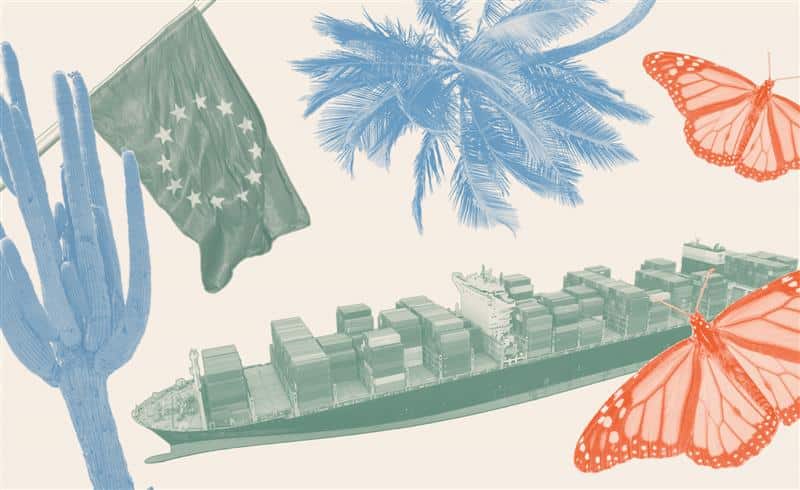
We need to rethink trade and the environment in the shadow of U.S. coercion.
The federal election took place in unchartered terrain, with the U.S.-instigated trade war against long-standing allies raging on, in a context of extreme deregulation in the U.S., increasing attacks by the U.S. on the international system and its own civilian population, as well as on the digital infrastructures, data and communication systems that protect the public interest, and monitor implementation and respect for the rule of law. The risks this geopolitical situation entails to energy, food, water and human security in Canada have led to a regrettable resurgence of political interest in, and support for, construction of fossil fuel pipelines across the country, and in finding new trade partners for Canada’s polluting fossil fuels.
The environmental and economic risks of fossil fuel expansion
This old-world response in the context of the climate crisis would decimate public health and ecosystems and go against the Intergovernmental Panel on Climate Change and International Energy Agency’s scientific recommendations while locking Canada in stranded assets, further expanding the immense economic, social, environmental and cultural costs of fossil fuel exploitation. An alternative, progressive and more prosperous approach would be to use this historical moment of trade disruption to strengthen coherence between trade and environmental agreements and propel the implementation of global commitments under the Pact for the Future, the Paris Agreement, the Global Biodiversity Framework and other cooperative mechanisms that support evidence-based and scientifically informed approaches to sustainable development. While the U.S. is busy dismantling its environmental laws and the federal agencies that are tasked to protect public and environmental health, the next Canadian government needs to acknowledge that expanding trade with the U.S. will necessarily undermine environmental and public health protection across borders. Already, Canada’s bilateral arrangement with the U.S. for plastic waste trading violates international and national legislation because of lax U.S. environmental standards. To counter the transboundary impact of the United States’ widespread environmental deregulation, Canada should not only rescind this arrangement, it should also ensure that all our future trade agreements integrate fundamental environmental principles, including the precautionary principle, polluter pays principle and intergenerational equity.
While the U.S. is busy dismantling its environmental laws and the federal agencies that are tasked to protect public and environmental health, the next Canadian government needs to acknowledge that expanding trade with the U.S. will necessarily undermine environmental and public health protection across borders.
With a review of the Canada–U.S.– Mexico trade agreement approaching, different possibilities have been raised as to how the Canadian government should approach those negotiations, if at all. While there is discussion around Mexico and Canada each pursuing bilateral agreements with the U.S., this would be a regressive manoeuvre that would further empower the U.S. and go against the public interests of the two other countries. The reliability of the U.S. as a trade partner, as well as its trustworthiness as a member of the international community of states, has collapsed. Pursuing trade relations with a rogue superpower state such as the U.S. will substantially weaken Canada’s national resilience to systemic shocks.
A progressive path forward: Rethinking trade for sustainability
The disintegrating reliability of U.S. trade policy is a historic opportunity. However, our political leaders should not seize the moment by constructing polluting pipelines across Canada, as this would be a flagrant infringement of our international environmental and human rights commitments and would also hamper the multibillion dollars of investment that have been allocated to decarbonize our economy. Rather than launching us into a regressive nationalism based on reinvesting in a deceptive and inevitably declining boom-and-bust fossil fuel industry that has unfairly profited off the struggling working class to the benefit of its executives and shareholders, Canada must set its sights on overturning this historical injustice. We have the chance to strengthen relations with both long-standing and new trade partners: the EU and Mexico as well as the Global South and emerging economies. This is key to building an economic future that is not dependent on the hysterics of Washington but rooted in a diversified, ethical and resilient global network of allies.
Rather than launching us into a regressive nationalism based on reinvesting in a deceptive and inevitably declining boom-and-bust fossil fuel industry that has unfairly profited off the struggling working class to the benefit of its executives and shareholders, Canada must set its sights on overturning this historical injustice.
The wealth embedded in this approach is immense: new renewable energy markets, stronger domestic industries and a leading role in a global economy rooted in environmental justice and cooperation. By aligning its trade approach with the aim of reforming global economic structures to promote more equitable development and reduce global disparities, Canada can forge a trade policy that is both prosperous and just. As the era of economic dependency on the United States comes to a close, Canada’s newly elected federal government must assume leadership in fostering a global economic system rooted in ethical, sustainable and equitable global trade. This is not just a moral imperative; it is an economic opportunity, as well as an environmental and human security measure that can unlock immense wealth and prosperity for Canada and its allies.
Canada’s role in shaping a new global economic order
The United States’ approach to global trade is shifting toward an aggressive protectionism that disregards traditional alliances and global commitments to sustainability, peace and security. Canada must respond not by pleading for exemptions or renegotiating the trade agreement, but by charting a new economic course, one that prioritizes resilience, diversification and ethical wealth creation.
Canada’s renewed trade policy should prioritize economic justice and environmental sustainability by adhering to progressive guiding principles. These include respecting Indigenous sovereignty, reinvesting wealth in local and Indigenous economies and eliminating tariffs on environmental goods and services. New trade agreements should define and phase out harmful fossil fuel subsidies to eliminate market distortions that favour carbon-intensive sectors, promote eco-labelling and implement periodic environmental impact assessments, with specific attention to the potential effects on biodiversity, ecosystems and climate change. Additionally, a renewed trade approach should emphasize transparency, public participation and inclusive governance in trade negotiations, allowing for meaningful participation of civil society groups and Indigenous rights holders. This approach should support lifting trade barriers on green technologies, advancing climate change adaptation and collaborating with developing nations in sustainable trade. It should further promote environmental justice, workers’ rights in informal economies and ethical supply chains that respect human rights and environmental protections, by leveraging finance mechanisms to support ethical supply chains.
As the world faces new challenges from the United States’ growing trade isolationism and attacks on domestic, regional and international rule of law, Canada now has a unique opportunity to reclaim its leadership on the global stage.
Our new federal government is tasked with protecting the public interest, upholding Indigenous rights and building a resilient economy under massive global conflict and environmental collapse. In these times, it is imperative to remember that Canada played a pivotal role in creating the United Nations system, the World Health Organization and the International Labour Organization, and was a major contributor to the drafting of the Universal Declaration on Human Rights. As the world faces new challenges from the United States’ growing trade isolationism and attacks on domestic, regional and international rule of law, Canada now has a unique opportunity to reclaim its leadership on the global stage. By embracing a new internationalism, Canada can strengthen its alliances with like-minded nations and set pathways for multilateralism and trade that are embedded in the protection of fundamental rights, including environmental human rights. This renewed commitment to global cooperation and a visionary, progressive trade policy will not only reassert Canada’s historical role as a bridge-builder in international cooperation but also enable us to lead in shaping a fairer, more cooperative world order amid shifting geopolitical dynamics.
Related projects
Always grounded in sound evidence, the David Suzuki Foundation empowers people to take action in their communities on the environmental challenges we collectively face.



